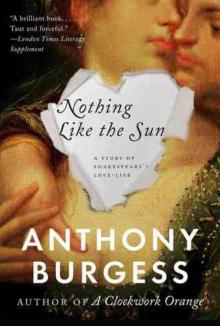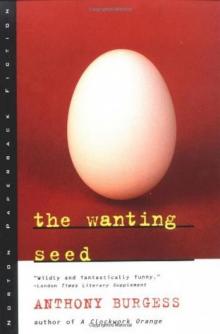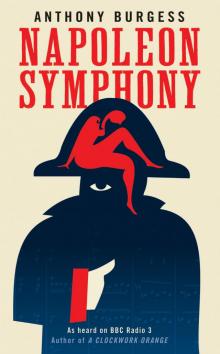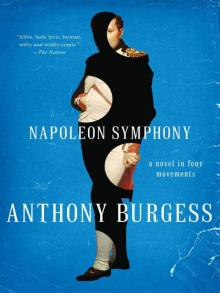- Home
- Anthony Burgess
ABBA ABBA Page 8
ABBA ABBA Read online
Page 8
"One cannot doubt that, your eminence."
"And now Europe changes again. The Napoleonic flame flares, as if sugar had been thrown on it, for one last time, and the big grandiloquent odes will be written."
"Not by me, your eminence."
"Not by you, my son. What is this I hear about your losing your taste for grandiloquence? There is a sonnet of yours going about, one written in the Roman dialect. It condemns or scorns or something some holy poem written on the Blessed Virgin."
"I do not condemn the substance but the form. There are some self-styled poets in the Academy of the Tiber who launch words like balloons. I prefer my words to be small but full of gravity. Mass, not size. Napleon's death will launch plenty of balloons, your eminence. They will all come down. Now a word of metal makes no pretension to flying."
"You are not here, my son, to deliver a theory of literature."
"No, your eminence. You started it, with respect, your eminence."
"You are here," kindly smiling, up on his feet, ringed fist banging Belli's shoulder, "to discuss the future of Rome and your future in the Rome of the future."
"How far into the future, your eminence?"
The cardinal prepared to kick back a log dislodging, saw that he had a silk slipper on, desisted. Belli thrust out his booted foot without otherwise stirring from his chair and smartly sent the log back in a grumble of sparks to nest again with its fellows.
"Well, now, we gained our independence from the French Empire six years back. His Holiness resumed rule of a city that had tasted the rank meat of Jacobin republicanism -"
"Rank, I question that rank with respect. Fresh meat rather, very bloody. Rank suggests long-hung and mouldy."
"Like," the quick prelate said, "the city itself. You were about to say that, were you not?"
"No, but since you have put the idea into my head, your eminence, I will now say, with respect and in the humility of a son of Rome, yes. Yes. Our drains are bad, our streets carry no name plaques, we lack light -"
"So the Urbs Lucis lacks light, does it?"
"I am talking of the physical city, your eminence. In London they now have gas lighting, so a London visitor told me."
Cardinal Fabiani shook two gemmed fingers brilliantly at Belli. "I know very well what you are talking about, and my response then was by way of a rebuke. You are slow sometimes, my son. What does the physical city matter? This is the City of God, and all above the dirt and madness of the body."
"The Holy Father is a temporal ruler. There are, with respect, such things as temporal obligations."
"We have no ambition here to be London or St Petersburg -"
"We are already St Petersburg, we were re-founded as St P -"
"Very sillily clever, you are always ready with your word play and your word play may well prove your undoing, my son. You are not here drinking my wine and eating my victuals to indulge in your silly games of the Academy of the Tiber. You are here to consider the future of Rome."
"I'm flattered, your eminence, that I should be considered worthy."
"Giuseppe Gioacchino, you are no fool, otherwise I would not put up as I do with your nonsense. No fool, but no thinker either. It is your flashes I want, what I suppose you would call your imagination."
"The vatic, the poet as vates. Thus flash I forward to the future, eminence. His Holiness will not rule this city for ever. The papacy as military power, which is all civil power has ever meant on this peninsula – the notion was already dying with Julius II. And that one dying on St Helena, he is thought to have lost but has really won. He has taught the new idea of the unified nation, and the idea will not be long in coming here."
"Bonaparte was never an idea, he was a man, my son, mortal but endowed with a devilish big ability. Such men are not ten a penny. He ate the papacy for breakfast, but it will be centuries before such another comes. Peter's seat is safe."
"Yes, eminence, if by Peter you mean merely the keeper of the keys."
"Merely? Merely?" But Cardinal Fabiani poured Belli more grappa.
"I prophesy that the secular rule of the papacy will be over in, oh, say twenty years. His Holiness, whoever it shall be, must keep within his Vatican walls and smirk at the Roman populace from St Peter's at Christmas and Easter. From a balcony, very high up. The secular power will be in hands as yet unknown and the Pope will be reviled and sneered at as a ruler of Christian souls, for the soul itself will be sneered at as a pretentious silly hypothesis. The kingdoms of Italy will be made into one kingdom and Rome has as good a chance as Milan or Turin of being its capital city. Better, perhaps, because of its position."
"Kingdom, you say. Who will be king?"
"Whoever the kingmaker decides on. And do not ask me to name the kingmaker because he may be now a snotty boy peeing his breeches. I apologise, your eminence."
"You have this Roman coarseness in you, my son. So that is your picture of the Roman future, eh?"
"Not a future I greatly relish. I'm temperamentally incapable of thinking in terms of – big national unities. Italy to me is the name of a land leg and a land belly above belted with spiky mountains. I'm a Roman and it's enough to be a Roman. What's good enough for a Caesar is good enough for a Belli. Soon they'll be talking of a language called Italian which any good Italian patriot must speak and write, forgetting his Roman, and his Venetian or Milanese for that matter, disregarded dialects with literatures ignored by the big dottori. Bad as things are here and now, I prefer them to what's to come."
"Bad?"
"Oh, what I said – the stink of uncollected garbage, robbers in alleys, no street lamps, too many jacks-in-office."
"Of whom you are one."
"A very small jack, your eminence. Just big enough to stop me living off my wife."
"You could," Cardinal Fabiani said, "be a very big one." Belli said nothing. He looked into the golden firecave, waiting. "I reject your prophecy," his eminence said. Belli shrugged Romanly. "Things will not be as you say, at least not in our lifetime."
"You must, as ever speak for yourself, eminence."
The prelate ignored that. "Expect hotheads, a renewal of jacobinism, republican claptrap, inept pasquinades, inflammatory pamphlets, street-corner evocations of a Bonaparte who ceased to exist even before the turn of the century. Rome, however, will not yield one whit of its ancient and blessedly recovered divine authority. What do you say, my son, to a central bureau of censorship of which you shall be the head?"
"Censorship? More than already exists?"
"The theatres as well as the newspapers. The opera house. Poems and novels and cheapjack modernist metaphysics. The printed and spoken and enacted word. What do you say?"
Belli got up to kick back into confirmation of its place a log that had been proposing dislodgement for half an hour past. He remained standing, looking down on the meagre prelate who by our lifetime could mean no more than a meagre decade. He said: "There will be more police too, paid for with a heavier tax on salt and tobacco. With respect, your eminence, always with respect, I wonder how far you, a man of the Campagna, understand the Roman mind. Wait, with respect, and let me say my word, since it was for my word you asked me here to eat your fish and pullets. You can do anything to a Roman – indeed, you must do anything to a Roman, touching the very limit of oppression. A Roman expects nothing from his rulers except tyranny of one sort or another. Treat a Roman well and he will begin to think there is a catch somewhere and start brooding revolution. Probably they deserve to be so treated, the rats of this foul and beautiful sewer. They are probably all damned, and hell is a city much like Rome. They have no notion of morality, none of theology, none at all of history. Ignorant and damned. To many Romans, Rome is a tract only in space and not at all in time, so that the tyrannous Popes and Caesars share a kind of mythic contemporaneity. For that matter, Cain murdered Abel in an alley off the Piazza Navona, and Noah modelled his ark on the Porto de Ripetta ferry. That a bird impregnated our Blessed Mother none find it difficult to believe, since
after all bird is another name for prick -"
"You are getting off your point, whatever your point is or was."
"The Roman tongue has more words for prick and balls and cunt than any language in the world. They believe in nothing but hardship and getting drunk and fucking. Oh, they accept Christian doctrine as they accept Romulus and Remus and the mother-wolf, and they think that Pontius Pilate delivered his judgment in St Peter's. It seems very reasonable to them that God should play a dirty trick with an apple and then say: Posterity, you're fucked. They are all fucked and in turn they fuck. What I suppose I am saying is this, your eminence – for God's sake, with respect, don't dream of a holy city which can be made even holier by cutting off the outside world from its denizens. They don't believe the outside world exists, most of them -"
"You speak," said Cardinal Fabiani, at last sitting down on a chair whose arms writhed with cherubim, "of the common people, and you, my son, have used very common language in speaking of them."
"Mea maxima culpa. Holiness in others brings out the worst in myself. I am a positive saint in the company of atheistical sneerers. Common people? A holy city surely talks of souls all equal in God's eyes. Anyway, even poets and intellectuals Roman-born have enough of the common Roman inside them. I myself have. I try to keep it down, not always with success, then I yield and beat my breast after. The language which is my language, and which Dante's Tuscan disdains, is made out of melons and flyblown meat and piss and shit and -"
"I think we have had enough of that, my son."
"Yes, your eminence, I see we have. I am not good at censoring my own mind. I wonder you should so wish to honour me by – this proposal."
Cardinal Fabiani said nothing. He sat, hands folded, chewing crossly at some remnant of dinner that a hollow tooth had coyly cached and now yielded. "Do you think of God ever?" he asked at last. "Of the nature of God, of God's ultimate quiddity?"
Belli sat. "That, surely, is all laid down. The Church in its infinite wisdom instructs us as to the nature of divinity. As a Roman, of course, I have a somewhat undivine and non-eternal image of the eternal divine. What, may I ask, respect, respect and always respect, has this to do with censorship?"
"Everything," fiercely. "Everything. The terrible purity of God," more fiercely, "is what it is all about. Do you meditate ever on this terrible terrible purity?"
Belli nodded seriously and then thought for a minute before giving a verbal answer. "I have a clear enough image of God," he said, "but it is my own and perhaps heretical, perhaps too paganly platonic to be acceptable to my spiritual betters."
"Beware of Plato, my son. Aristotle is our rock."
"I think of a sonnet," Belli said.
"Mad, mad, are you mad?"
"Wait. Eminence. Respect, etcetera. The sonnet form must have existed in potentia from the beginning, but it was made flesh with such as Petrarch. Behind the thousands of sonnets in the world, in Tuscan, Roman, French, German, even English, shines the one ultimate perfect sonnet. It has fourteen lines that divide into an octave of a rhyme scheme ABBA ABBA and a sestet CDC DCD, really two tercets. One may vary the rhymes a little but the essential shape will remain. The wordless sonnet that still rhymes, that says nothing, having no words, but yet speaks. It says: I am this, but I am also this. In my eight lines X, in my six lines Y, but in my total fourteen ever the unity, the ultimate statement whose meaning its itself. What is this, your eminence, but the true image of God?"
"Heretical, yes, you were right when you said that. You talk of an abstraction, a ghost."
"I talk of an ultimate reality. And through the glimmering of it I have given you, a soul may speak to a soul. A Roman writes a sonnet on the divine beauty, and an Englishman writes a sonnet on an old tomcat, and neither understands the other's language, but in the recognition of the common form they meet." Shame suddenly washed him all over, like a sweat premonitory of crapulous vomiting. What devil made him do that, to tear up rudely a sick Englishman's homage? So, devil, was it? He would go and apologise, if he could find where he lived. Gulielmi knew, but Gulielmi had gone away. But tomorrow he might not feel like making apologies. It was, after all, a ribald and unworthy effusion wagging a beshitten tail. He had been right to suppress it, wrong to trust Gulielmi with it a whole day before its suppression. And yet the form in the mind of God did not reject it, any more than God himself rejected cazzi and fiche and the other dirty commodities of his creation. He might yet apologise, but it might be difficult to find out where the sick English poet lived. Or was dying. Cardinal Fabiani was saying something.
"- has always acknowledged, in its God-given wisdom, man's lower nature. The confessional is ever open for the discharge of the shameful ordures of humanity. But men must not wallow, they must be led, nay forced, to identification with their higher selves. Or, if you wish that in political terms, repressive government and occasional carnivals. Will you become our censor, in the service of a repression that is itself in the service of God's plan for the humanity he made in his own image and likeness?"
"Give me time to think of it. Time to come to terms with my own unworthiness."
EIGHT
"So, Severn, she said 'Voulez-vous profiter de ma caresse, monsieur?' and I, nothing loth, sneered up at the liveried tiger who sneered down, passing beneath him on my quick passage to the other door of her coach, and I was in there breathing the richness of her perfume, which was roses and violets and Eastern spices, Severn, and we galloped through the dirty streets not to the Villa Borghese but to the palazzo to which her husband the prince has banished her, Severn. He has banished her because she is too ready to summon any pretty man to her bed. Well, now it was I who was summoned and I was nothing loth. How shall I describe to you that long night caressing her long nakedness, holding in my arms the princess of love who is the sister of him who was like to be emperor of all the world? No prodigal outpouring of poesy's most opulent treasure could convey one whit of the ecstasies spent freely and as freely renewed.
"The bed itself, Severn, was in form of a gold trireme and the coverlet was of silk containing the down of innumerable eiderducks and cygnets. The sheets too were of silk that gave off crackles of electricity when we crawled thereon naked towards each other from opposed angles. She instructed me in all of the modes of physical possession out of her deep learning. Marry, I cannot remember the names of them all, but there was certes the pavonian touch, the Ledan straddle too, the chthonian ditch, the I think it was termed Ceutan flight and eke the Madrilenan interuberal. When, sweating and briefly weary of our sport, she rang for refreshment, the wine we drank we drank from heavy bronze cups with dove-feet, and there was fruit with, though this must seem impossible, dawn dew upon it though midnight had scarce struck. All this I tell you is true, Severn, in poetic truth it is all true.
"Guilt? Why should guilt touch me with its scaly wing? I have been faithful to the limit, have I not? Would it be just for me to be denied what his lordship takes with such aristocratic carelessness daily, nightly, matutinally, postmeridianly, serally? She should have yielded when I asked, Severn, but I well remember the afternoon when, her mother gone out visiting, we stood looking at each other's feet, unwilling to engage each other's eyes, our breasts heaving, and she said somewhat to the effect that this was the fate imposed upon us by a social order that chains neither the milord nor the stinking swinking I would say artisan but reserves its bondage for all who wear clean shirts and pressed muslin and chat with the rector after matins but have nothing in goldsmith's notes. Ah, the risk and the scandal. But I, Severn, have had a whole manhood of fleshly longing crammed into a boy's years, and Alma Venus or Queen Mab or l'ultima principessa could give in no wise to my fancy what she she she denied to my body.
"Then thousand curses and stinging blights light on it all and on her too who turned her desirable back on the prospect of a paradise pardieu for herself as much as for me, poor dogsbody, Severn. I wanted her so much, stripped of her demure muslin and her warm body snaking or
lamiating in my warm arms, hers and hers only and to the inferno with Alma Venus. God or whoever's up there rain down stinking ordures on her who withheld so through fear of Mr Snigg and Mistress Sniff and the Reverend Snoggsbody and invoked an unjust propriety to leave me quenching my fire with cold water and tired lettuce leaves. Radishes and onions and eke turnips and potatoes are, e'en uncompanioned with gross bloody beef or fat lusty pork, promoters enow of lawless lechery. And Burton laughed, I swear his laugh broke an instant from the frontispiece woodcut of his wry costive countenance.
"Well, he was in the right of it, e'en so your worship. And all the poets dead and gone laughed too and laugh still. This afternoon I had a long colloquy with mad Will, who speaketh good Florentine I may say, though he was helped out on a word here and there by Master Florio, ever banging at his open dictionary as at the King's Bible. But in fair English he told me, the sounds sweetly Italianate, and after a while he laughed but little, that there is nothing after this, neither fire nor ice, for he has wandered like a ghost and longed to lap blood. There is nothing, saith he, like the red din of an aching tooth as it engageth good hot meat, nor the nutmeg and cinnamon in mulled ale thudding on the arch of the palate, nor the dove-soft touch of a young love's ripening breast.
"Of that I could endite well, Severn. Had I but had time and sense I could have writ a great long poem on the sweetness of the breasts of the enchantresses of history, from Helen to Alma Venus here in Rome who has had her right breast modelled in marble by Maestro Canova or some such rogue. And of the aching sweetness of the soft swell outwards from the waist to the buttocks, and the faint sweet down on the skin. Away with your bloodless Jesus, I say.
"Well, no, not so truly, since he had blood enough in him and fire enough and his whipping arm was strong. It is that the enemy of the world has filched and perverted him, the enemy that rules now, Severn, and you would wish to know who he is and behold I will tell thee. He is all against life, meaning the thud of the heart in venery, the savour of claret, the clamorous morsels of spring in the nest you by chance uncover, hawthorn and goldenrod, good witty lechery in the company of men, the green waving tree, tough-boled, of the body. It is not enough for him to suck blood only at once to spew it forth, he must also poison the very wells of blood. His name may be Wells for all we know, or Flibbertigibbet or Cacasona, it matters not. He is cacodemon of decay, and it is not the decay of the grass-dropped apple in autumn. For the apple dies in sweetness but I do not.

 A Dead Man in Deptford
A Dead Man in Deptford Honey for the Bears
Honey for the Bears 1985
1985 A Clockwork Orange
A Clockwork Orange The Doctor Is Sick
The Doctor Is Sick Earthly Powers
Earthly Powers Nothing Like the Sun
Nothing Like the Sun Collected Poems
Collected Poems The Kingdom of the Wicked
The Kingdom of the Wicked The Wanting Seed
The Wanting Seed Napoleon Symphony
Napoleon Symphony The Malayan Trilogy
The Malayan Trilogy A Long Trip to Teatime
A Long Trip to Teatime Enderby Outside
Enderby Outside M/F
M/F The Complete Enderby
The Complete Enderby Napoleon Symphony: A Novel in Four Movements
Napoleon Symphony: A Novel in Four Movements Enderby's Dark Lady
Enderby's Dark Lady The Clockwork Testament (Or: Enderby 's End)
The Clockwork Testament (Or: Enderby 's End) ABBA ABBA
ABBA ABBA A Clockwork Orange (UK Version)
A Clockwork Orange (UK Version)